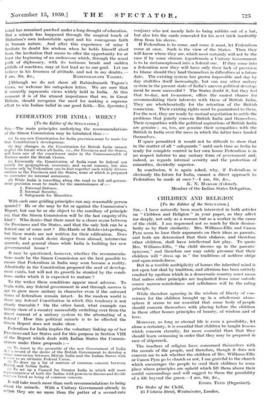CHILDREN AND RELIGION [To the Editor of the SPECTATOR.]
Sirt,—I have naturally been much interested in both articles on " Children and Religion " in your paper, as they affect me deeply, not only as a woman but as a worker in the cause of the child. I am impressed not so much by their dissimi- larity as by their similarity. Mrs. Williams-Ellis and Canon Pym seem to base their arguments on their ideas as parents, and both are determined that their chileren, and therefore other children, shall have intellectual fair play. To quote Mrs. Williams-Ellis, " the child dresses up in the parents' opinions," and therefore one may safely presume that their children will " dress up in " the traditions of noblesse oblige and open-mindedness.
But in a terrible multiplicity of homes the inherited mind is not open but shut by tradition, and altruism has been entirely crushed by egotism which in a democratic country must mean that unless other principles are implanted from some outside source narrow-mindedness and selfislmess will be the ruling
principle.
While therefore agreeing in the wisdom of liberty of con- science for the children brought up in a wholesome atmo- sphere it seems to me essential that some body of people should concern themselves with placing before the children in those other homes principles of beauty, of wisdom and of love.
Moreover, as long as eternal life is even a possibility, let alone a certainty, it is essential that children be taught lessons which concern eternity, far more essential than that they should learn swimming in order that they may be prepared in case of shipwreck.
The teachers of religion have concerned themselves with the morals of the people, and therefore, though it does not concern me to ask whether the children of Mrs. Williams-Ellis or Canon Pym go to church or not, I am grateful to the church which encourages the people to send their. children to some place where principles are upheld which lift them above their sordid surroundings and will suggest to them the possibility of a life beyond the grave.—I am, Sir, &c., 25 Victoria Street, Westminster, London.








































 Previous page
Previous page